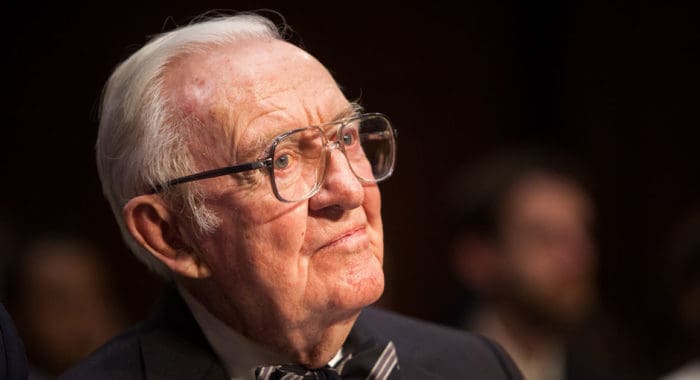Reader Gilbert Ambler writes . . .
Retired Supreme Court Justice Stevens recently wrote a New York Times op-ed where he advocated for the repeal of the Second Amendment. This is a troubling, not only because of the position he advocated, but also because it signals that Justice Stevens knew his prior position on the Second Amendment was legally indefensible.
When I began law school I possessed what I now recognize was a romanticized notion of what judges do. I naively believed, as I was taught, that our system of governance continued to function seamlessly, with checks and balances on power safeguarding America against tyranny. I had learned that the legislative branch made the law, the executive enforced it, and the judicial branch interpreted and applied law to facts. That was then. Now, I’m more jaded.
No longer do I perceive judges as dispassionately carrying out the judiciary’s assigned role without bias or political motive. And Justice Steven’s op-ed has cemented my view.
Stevens was one of four Supreme Court Justices in the minority in D.C. v. Heller, and authored a dissenting opinion. The question in Heller was whether the Second Amendment was violated by the District of Columbia’s de facto ban on handguns, along with their requirement that weapons kept in the home be stored in a non-functional manner.
Fortunately for gun owners, and all those committed to the integrity of the Constitution, the Supreme Court decided that such a ban did indeed violate the Second. However, in his dissent, Stevens argued that although the right is granted to “the people,” the language does not “enlarge the right to keep and bear arms to encompass use or ownership of weapons outside the context of service in a well-regulated militia.”
Stevens then analyzed what constitutes a “well-regulated militia,” and explained that service in well-regulated militias declined steadily from 1792 until the president “revitalized the militia by creating ‘the National Guard of the several States.’” The takeaway of all of this is that Justice Stevens, along with Justices Souter, Ginsburg, and Breyer, claim that you must be in an organized militia — namely the National Guard — in order to have a Second Amendment right to own firearms.
For gun owners and the majority of the Supreme Court at the time, this reading was inconsistent with the founders’ intent. Stevens’ dissent takes on a new and more abhorrent meaning when viewed through the lens of his recent op-ed admission.
In his op-ed, Stevens applauds gun controllers’ demands for their legislature to restrict items like semi-automatic rifles. But he thinks that further action is needed and recommends overturning Heller by repealing the Second Amendment altogether. While Stevens claims to retain faith in the position he took in his Heller dissent, his demands for outright repeal tell a different story.
Stevens advocates for repeal to “minimize the risk of mass killings of schoolchildren and others in our society.” This is where the fundamental problem arises. I have yet to hear of a National Guardsman participating in a mass shooting. If Justice Stevens truly believed that the Second Amendment only grants rights to those in the National Guard, then he would simply advocate overturning Heller, rather than repealing the Second Amendment as a whole.
Based on his Heller dissent, repealing the Second entirely would remove arms from National Guardsmen, which seems like an unnecessary (even counter-productive) proposition for his stated goal of protecting society. As a former Supreme Court Justice, Stevens certainly understands well that overturning Heller and deciding a future case in a manner consistent with his Heller dissent would create the ability for states to remove firearms from civilians. That should be enough to create the change he desires.
Or, it would be, unless he knows that the position he took in his Heller dissent was inconsistent with the Constitution. Unless he knows that to remove weapons from civilians, the Second Amendment must be repealed. Unless in Heller, he jumped through legal hoops to decide what he wanted the law to be, rather than what it was. Unless in Heller, he simply didn’t do his job.
These probabilities reinforce my suspicions that judges allow their personal political motivations to creep into their decisions. I applaud Justice Steven’s honesty about his end goal of repealing the Second Amendment, rather than parroting that “no one wants to take your guns” line. But I rebuke him for making political rather than legal decisions as a Justice. And I abhor his desire to remove the Second Amendment and Americans’ right to keep and bear arms, which stands as a final fail safe check on the power of a potentially tyrannical government.
Gilbert Ambler is currently weeks away from graduating from the Dickinson School of Law in Carlisle PA, and is a staunch supporter of adherence to constitutionally guaranteed freedoms.
